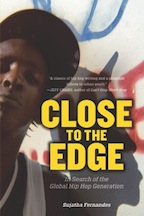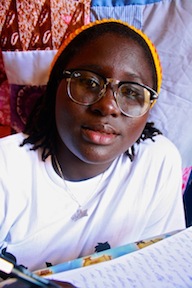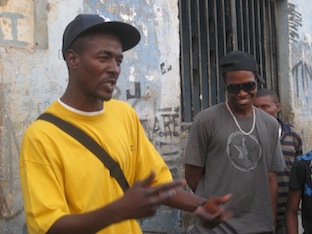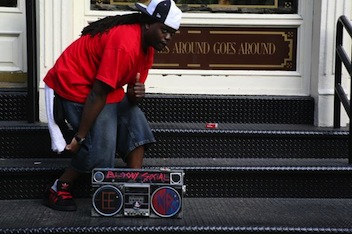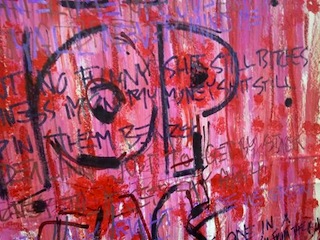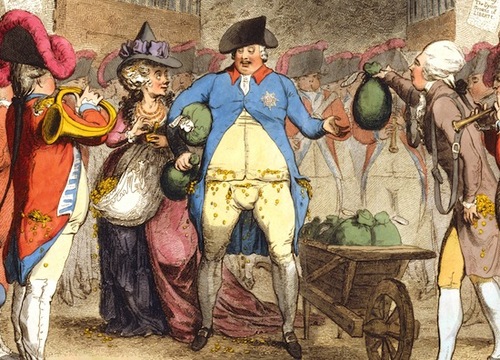Introduction: The Making of a Hip Hop Globe Pedro Alberto Martínez Conde, otherwise known as Perucho Conde, was probably the first rapper to compose a hit song outside the United States. A poet and comedian from the inner-city Caracas … Continue reading “Close to the Edge: In Search of the Global Hip Hop Generation (Book Excerpt)”
Category:
We interrupt this dispatch … Occupy Oakland and the General Strike!
Hannah Chadeayne AppelI didn’t realize how claustrophobic Wall Street’s Liberty Park was until I arrived at my home Occupy in Oakland. Rather than the jumble of tarp-covered shelters that grew and morphed rhizome-like through Liberty Park, Occupy Oakland’s colorful tents felt positively … Continue reading “We interrupt this dispatch … Occupy Oakland and the General Strike!”
"In One, All": Senegalese Women Freestyle Artists Unify the Global Ghetto
ali colleen neffAs plenty of proud nostalgic discourses locate the residues of hip-hop culture circling the drains of sample exhaustion, scene fatigue, patched-in cameos, or the same old cushy R’n’B, people world over just keep going about inventing new worlds of musical … Continue reading “"In One, All": Senegalese Women Freestyle Artists Unify the Global Ghetto”
Bearing Witness and the Challenges of Community in Global Hip Hop
derek pardueKabu verdi / Nu bai / Gosi nu sta na Portugei / Nu bai / Es ta ben y sai / Chullage “Cape Verde / Let’s go / Now, we’re in Portugal / Let’s go / They [my people] … Continue reading “Bearing Witness and the Challenges of Community in Global Hip Hop”
"Wherever I Bless a Microphone": Ethnographic Perspectives on Hip-Hop's Transnational Flow
joseph schlossSujatha Fernandes’s Close to the Edge explores a variety of contexts in which hip-hop is practiced around the world, and draws them together with the thread of Fernandes’s personal experiences. My own work has been based on the ethnographic … Continue reading “"Wherever I Bless a Microphone": Ethnographic Perspectives on Hip-Hop's Transnational Flow”
Leaping Towards The Edge
anthony kwame harrisonOne of my earliest recollections of the contradictions inherent in hip hop’s global spread happened in July 1995 when I, rather suddenly, noticed my friend Marwan’s younger brother Samir pointing at me and singing “I said Hello Everybody” from … Continue reading “Leaping Towards The Edge”
A History of Debt
Maryam Monalisa GharaviUnder Review: David Graeber, Debt: The First 5,000 Years. Melville House Publishing: NY, 2011 ‘Tis to be a slave in soul, And to hold no strong control Over your own wills, but be All that others make of ye. –The Mask … Continue reading “A History of Debt”
The Ritual of General Assembly and the Bureaucracies of Anarchy
Hannah Chadeayne AppelIf you have spent anytime with Occupiers, you have seen people (sometimes by the thousands) hold their hands above their heads and wiggle their fingers. Jazz hands? Cult sign? Known as “twinkling” when it expresses a positive sentiment, the hand … Continue reading “The Ritual of General Assembly and the Bureaucracies of Anarchy”
The Dirt, or, Matter Out of Place
Hannah Chadeayne AppelIn her 1966 book Purity and Danger, anthropologist Mary Douglas famously explains dirt as “matter out of place.” Dirt does not index an objective category of pathogens or pollutants she suggests, but rather the designation of “dirt” indexes a contravention to a social order, and by extension, its boundaries.
The People's Microphone
Hannah Chadeayne Appel“Mic check!” The shouted exclamation punctuates the days at Occupy Wall Street (OWS). A lone voice yells it from somewhere in the crowd, soliciting the hoped-for response, “mic check!” yelled back by all within earshot of the initial call. Often the response is weak the first time around. Maybe the caller is surrounded by people new to the movement, who aren’t yet familiar with the rituals, or don’t yet feel comfortable making them their own; maybe the voices around her are tired, from so many days and weeks of the people’s microphone. But with a second, often more insistent call, “mic check!” the surrounding voices rise in response, “mic check!”
An Introduction
Hannah Chadeayne AppelOccupy Wall Street’s numbers have swelled to thousands here in New York City, not to mention the Occupy Together Movement across the country. At the October 10th General Assembly meeting–held every evening at 7pm–the kitchen announced that it serves 2000 people free food every day. The Occupied Wall Street Journal is in its second edition, with the first also translated into Spanish.
Tropic of Chaos: Christian Parenti Interviewed
Ashley DawsonIn this interview, Christian Parenti and Mike Menser discuss issues raised by Parenti’s recently published book Tropic of Chaos: Climate Change and the New Geography of Violence. The Geography of Catastrophic Convergence MM: Kenya, Uganda and East Africa, Afghanistan, Pakistan, … Continue reading “Tropic of Chaos: Christian Parenti Interviewed”
I was a Wall Street zombie
Tavia Nyong'oTechnically, I never worked on Wall Street. But, for a difficult year in my early twenties, I did don a suit at the crack of dawn and schlep down to one bank or another in the financial district or, occasionally, to one of its outposts in Long Island City, Queens, or Stamford, CT. Citibank, Chase Manhattan, American Express, Swiss Bank. I was a perma-temp in a series of glorified secretarial pools, the highest paid work my liberal arts degree could secure me, even in the middle of the Nineties dot com boom.
Is it a Crime? The Transgressive Politics of Hacking in Anonymous
Michael Ralph and Biella Coleman“Ain’t no such thing as halfway crooks…” -Mobb Deep, “Shook Ones,” Infamous Mobb Deep “there are so many different anonymous networks with different terms of use so i keep mixing them up” -Anonymous on Anonymous (#anonops) September 25, 2011 Joseph … Continue reading “Is it a Crime? The Transgressive Politics of Hacking in Anonymous”
Cameras are Weapons for #OccupyWallStreet
Michael MandibergTo note that a camera is a weapon is nothing new. Susan Sontag articulated the relationship between the camera and the semiotic violence that “turns people into objects that can be symbolically possessed.” For Sontag the violence was symbolic, as … Continue reading “Cameras are Weapons for #OccupyWallStreet”


